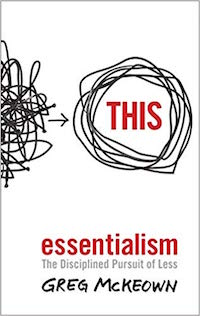I recently read Greg McKeown’s book, Essentialism: The Disciplined Pursuit of Less. This is a good book, which I recommend. I agree with 98% of what he says, and I have on my agenda to re-read it. My goal will be milk a little more of the wisdom out of it.
I was handicapped on the first reading, because I kept expecting an explanation of how to essentialize. It’s not there. Don’t go looking for it.
This book is 21 loosely connected chapters on how to cope with the overload endemic in the 21st century. The topics of the chapters range from the power of choice, to the need for sleep, to when to say “no.”
If this sounds like advice you have already heard — well, you have, to some degree. Although we reach essentially the same conclusions, McKeown has his own firsthand perspective on many of the issues I address in the Thinking Lab.
For example, he has a chapter on “the power of extreme criteria.” He encourages you to say “yes” to only the best projects, the best candidates for the job, the best use of your time. How? One suggstion is “the 90% rule.”
As you evaluate an option, think about the single most important criterion for that decision, and then simply give the option a score between 0 and 100. If you rate it any lower than 90 percent, then automatically change the rating to 0 and simply reject it.
This is radical advice. But it is consistent with what I’ve learned: If you want a productive, happy life, you need to systematically pursue your own top values. If you settle for halfway measures on your top values, you will be in a perpetual state of conflict.
Like many business books I read, this book leaves me wishing for a deeper explanation of the “how” and “why” of these methods. But that is my work.
This book caused me to reflect on the problem that McKeown and I (and others) are working on: How, in the 21st century, when we have unparalleled individual choice, do you create a happy, productive life for yourself?
Choice is a “problem” that comes with wealth. No one reading this newsletter is scraping by with subsistence farming. With wealth comes options — many values to pursue, many ways to pursue values. In the past, only a small fraction of the population had such options. Now, everyone in the United States has such options. Worldwide, a larger and larger percentage of the world’s population does.
With choice comes responsibility. Your choices today — and your non-choices — impact the course of your life and your future happiness.
To address the need to choose at a deep level, you need more than a book of tips. You need a philosophy for living on earth, which I have thanks to Ayn Rand. This book reinforces my long-ago decision not to assemble a book like this. I’m working on something deeper.
But that doesn’t mean a book of tips isn’t valuable. It is. Essentialism offers practical advice, a vision of how a happy, productive life can be lived, and the hope that you can achieve it yourself.








0 Comments